"*" indicates required fields
Dental Implants – Chelmsford, MA
A Long-Lasting Solution to Tooth Loss
When it comes to replacing teeth, no other option can beat dental implants. These posts stand above dentures and dental bridges in many ways – durability, stability, looks, and more. The result is that today’s implants are viewed as the gold standard of tooth replacement. As for their other details, our practice will gladly share the facts with you. All you need to do is keep reading or book a visit to see us!
Why Choose Chelmsford Dental Specialists Group for Dental Implants?
- Entire Treatment Done In-House
- Award-Winning Prosthodontist
- Sedation Options That Ensure Calm Care
What Are Dental Implants?

At their core, dental implants are small, durable posts made of titanium. Dentistry uses these tooth-sized bits of metal to replace the crowns and roots of missing teeth.
Dental implants aren’t placed like dentures or dental bridges, with a device sitting on the gums. Dentists set them right in your jaw’s empty sockets through a very precise surgery. That way, the implants slowly fuse with your jawbone and become permanent parts of your mouth. They’ll then be secure enough to support abutments (i.e., metal connectors) and final restorations.
Maintaining & Caring for Your Dental Implants

We want to make sure that all of our patients have an accurate idea of what will happen when they choose to get dental implants. The process normally takes months, but rest assured that by the time it’s complete, you’ll have a beautiful, sturdy new smile that will help you get the most out of life! There are four main steps that make up the dental implant process; here’s a closer look at what they involve.
Initial Dental Implant Consultation

During the initial consultation, we’ll need to answer a number of questions: Are you a candidate for dental implants? How many implant posts will you need? Where should they be placed in your mouth? Will bone grafting or other preliminary treatments be required?
A thorough examination of your mouth and facial structures will help us find the answers we need. Once we have all the necessary information, we can put together your personalized treatment plan. An estimate of the timeline and cost of the dental implant process will be provided, and you’ll be given the opportunity to voice your own questions or concerns.
Dental Implant Surgery

To place dental implants, we will need to make small incisions in your gums. Then, we will carefully insert the implant posts into the jawbone. Each post will be placed at a precisely chosen location to ensure the highest chances of success. At the end of the surgery, the gums will be sutured shut, and a protective cap will be attached to each post.
Don’t worry about discomfort during the dental implant surgery. Your mouth will be kept numb the whole time, thanks to a local anesthetic administered at the start of the treatment.
Dental Implant Osseointegration & Abutment
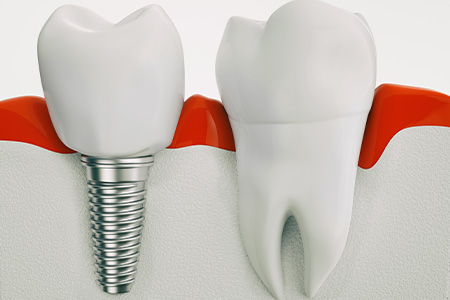
Osseointegration is when the dental implants fuse with the bone around them and essentially become part of your jaw. This normally takes around 3 to 6 months; you will need to take care of your mouth during this time to make sure nothing disrupts the osseointegration process.
An implant post that has fully joined with the jawbone is ready to receive an abutment, which is the metal connector piece that will help keep your replacement tooth or teeth anchored in place. Rest assured that placing abutments is a simpler procedure than dental implant surgery.
Delivery of Dental Implant Restoration(s)
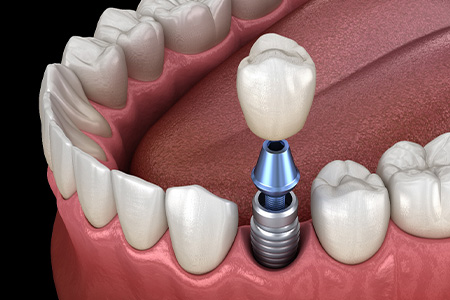
We’ll capture impressions of your mouth so that a personalized crown, bridge, or denture can be created at a separate dental laboratory. The completed prosthesis will be sent to our office, at which point we can schedule one final appointment to attach it to your implant posts. Once your new teeth are in place, we’ll double-check to make sure that everything looks good before you leave with your re-completed smile.
Benefits of Dental Implants

Your dental implants will come with some unique benefits! Since they’re anchored to your jawbone, you can expect superior stability and a more comfortable, natural fit. If you’re interested in seeing what your life could be like with this high-tech restoration, read the information we’ve put together below. You’ll get more detailed insight into the day-to-day, health, and long-term advantages.
Day-to-Day Benefits

Brushing your teeth. When you wake up in the morning and are getting ready to tackle the day, brushing and flossing your restored smile will be a breeze. You likely won’t even have to change your routine – simply brush twice daily with a soft-bristled toothbrush, and floss between your pearly whites at least once per day.
Enjoying meals. One of the best benefits of dental implants is that they enable you to eat more food. Juicy steaks, crunchy vegetables, delicious fruit, and all of your favorites can be back on the menu!
Talking with loved ones. With dental implants firmly rooted to your jawbone, you won’t have to worry about slippage while talking with your loved ones. Your speech will be as smooth as if all of your teeth were natural.
Health Benefits

Preserve your jawbone – and youthful features. Without a dental root in place to provide essential stimulation and circulation, your jawbone will actually start to deteriorate. Typically this loss of oral structure makes the face appear sunken and tired. Dental implants, however, effectively replace lost dental roots, preserving your jawbone and youthful features.
Prevent dental drift. When there are gaps in your smile, your teeth will likely respond by shifting their positions in order to compensate. This can result in crooked pearly whites and an uncomfortable bite. With dental implants in place, your natural teeth will stay put, helping you avoid the need for orthodontics.
Long-Term Benefits

Advantages that will last a lifetime. Dental implants have a stunning success rate of 95%. What’s more is that this rate stays constant even after ten years of use! Your implants will benefit you for years to come, and if you take good care of them, could even continue to do so for 30 years or more.
Irreplaceable confidence. Because dental implants can make your day-to-day routine easier, promote your oral health, and can last a lifetime, you can be confident in your smile. You’ll find that your implants are incredibly reliable – and that your pearly whites look fantastic!
Who Dental Implants Can Help
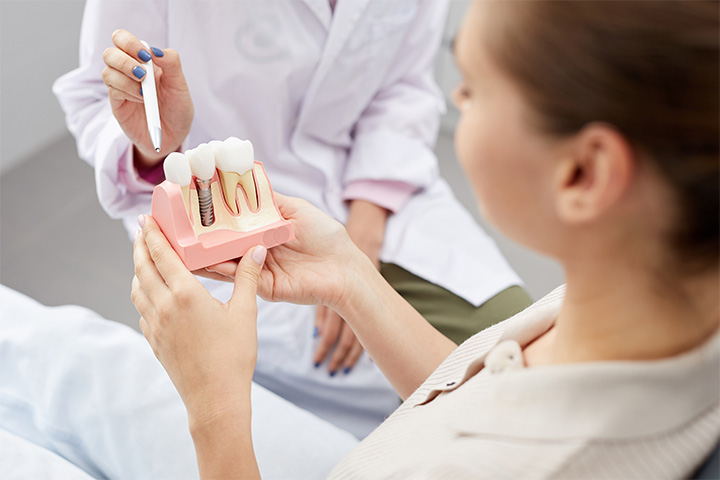
No matter how many teeth you’ve lost, you likely qualify for dental implants. Good treatment candidates just need healthy gums and a dense jawbone. Once we’ve settled those factors, we can confirm the type of implant you need based on the teeth you’re missing.
Missing One Tooth
A dental implant and a crown should be enough if you only lack one tooth. With this pair of prosthetics, your treatment results will last longer than a dental bridge would.
Missing Multiple Teeth
When you’ve lost several adjacent teeth, an implant bridge is the ideal option. This type uses dental implants instead of the more traditional dental crowns. On the other hand, an implant denture could work if the missing teeth aren’t adjacent.
Missing All Teeth
An implant denture is your best bet for severe cases of tooth loss. Unlike other kinds, it uses four to six implant posts to support the whole prosthetic. This small number of implants is enough to keep the full denture in place, allowing results that restore your full smile.
Understanding the Cost of Dental Implants

How much can you expect to pay for dental implants? This question seems simple enough on the surface, but the answer can vary significantly from case to case. The fact of the matter is that there are several factors that help determine the cost of the dental implant process. Rest assured that our team will provide you with a reliable estimate before you need to make any commitments, and we’ll work with you to make sure that the treatment can fit into your budget.
Preliminary Treatments & Dental Implant Surgery
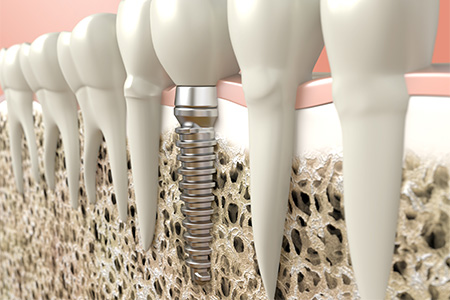
Before you can have dental implants placed, you may need to undergo bone grafting or other preliminary treatments. These procedures will add to the overall cost of the process, but they are often necessary for ensuring the long-term success of your implant posts.
As for the actual dental implant surgery, the cost can be influenced by where the implant posts need to be placed as well as other factors. The good news is that our team is able to offer in-house dental implant placement, so you can avoid the inconvenience of being billed by a separate practice.
The Parts of Your Dental Implant
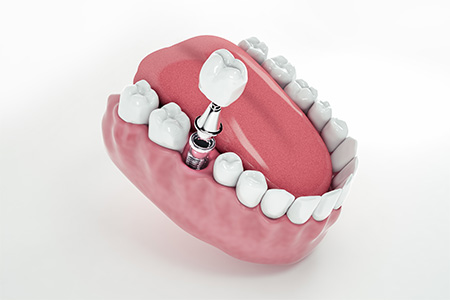
The cost of your dental implants can be influenced by:
- The Number of Implants: Obviously, getting a single dental implant to replace one tooth will cost less than replacing an entire arch of teeth with 4 or more implant posts.
- The Type of Prosthesis: Depending on your tooth loss situation, dental implants can support crowns, bridges, or dentures. Each type of prosthesis comes with its own price tag.
- The Material Used: Dental implant posts can potentially be made out of zirconia or titanium. The type of material used will have an impact on the cost.
- The Brand of Dental Implant: There are different dental implant brands that come with their own unique benefits. Be sure to ask your dentist about the brand of dental implant they use and how it will affect the amount you will ultimately need to pay.
How Dental Implants Can Save You Money

While dental implants carry a higher initial cost than other tooth replacement options, they can actually end up saving you money. For one thing, since they last for decades with the right maintenance, you will rarely (if ever) need to worry about paying to have them replaced. Furthermore, dental implants can be brushed and flossed like natural teeth, so there’s no need to invest in any specialized cleaning products to take care of them.
Does My Dental Insurance Cover Dental Implants?

Many dental insurance plans do not offer coverage for dental implants, but they might still be willing to pay for certain parts of the dental implant process, such as any preliminary procedures that are deemed necessary. Our team can review your dental insurance policy with you to ensure that you have a clear idea of what is and isn’t covered. On top of that, we can file the necessary claims for you so that you don’t have to worry about the paperwork.
Making Dental Implants Affordable

Even if you don’t have dental insurance, you can still make the cost of dental implants more manageable by applying for CareCredit financing. A low-to-no-interest CareCredit plan will allow you to pay for your treatment in installments that are right for your budget. If you’re interested in learning more about CareCredit, talk to our team.
Dental Implant Post-Op Instructions

Thanks to Dr. Gatti’s expertise, our team can complete the entire dental implant process in-house. We’ll take care of the surgery and restoration process so you can focus on recovery. Following dental implant post-op instructions in Chelmsford is important for promoting the success of your treatment! To help make sure you achieve a smile you’ll love, we’ve outlined some general recovery tips. Rest assured – our team will review more personalized instructions with you before your surgery!
What to Do Directly After Dental Implant Surgery

After your dental implant surgery, your body will get to work creating a healthy blood clot near the treatment site. This clot will protect you from infection and painful sensitivity, so it’s vital that it remains intact for the duration of your recovery. You’ll have to:
- Avoid spitting
- Quit smoking and using tobacco products
- Avoid touching the implant site
- Drink carefully and avoid using a straw
Common Side-Effects When Recovering from Dental Implant Placement

It’s normal to experience some discomfort after your dental implant placement. That said, severe, persistent pain warrants a call to our office! To help you know the difference between an expected side-effect and a dental emergency, here’s a list of normal symptoms:
- Minor aches, soreness, and sensitivity
- Swollen gums
- Intermittent bleeding
Your Diet After Dental Implant Surgery

To preserve your blood clot and avoid discomfort, you’ll want to stick to a soft food diet after your dental implant surgery. Your pantry should be well-stocked with options like:
- Pudding
- Eggs (scrambled is best!)
- Soup with or without soft meat
- Yogurt
- Ice cream
- Mashed potatoes
- Pasta
- Pancakes
Post-Op Health & Oral Hygiene

Brushing and flossing your teeth might not be the first thing you’ll want to do after your surgery, but regular oral hygiene will help prevent infection and other serious complications. Make sure you’re still:
- Brushing your teeth twice daily with a soft bristled toothbrush (just be extra gentle around the implant site).
- Rinsing your mouth with salt water two to three times per day (and letting the solution waterfall out of your mouth instead of spitting it).
- Flossing once daily.
- Avoiding mouthwashes that contain alcohol.
What to Do After Your New Teeth Are Attached

Once we’ve confirmed your dental implants are properly fused with your jawbone, your long wait is over! Our team will get to work attaching the final restoration. Simply sit back in the patient’s chair and let us take care of you.
You may also experience some mild sensitivity after this step, but over-the-counter pain relievers should be able to manage your discomfort. If your pain worsens or you experience bleeding or swelling, call our office as soon as possible so we can check on your implants.
Maintaining & Caring for Your Dental Implants

Dental implants are highly durable, but they are not immune to damage. If you want them to last as long as possible, then you need to go out of your way to ensure that they’re properly cared for. Below, you’ll find our team’s recommendations for protecting your dental implants. By following these steps carefully and being proactive about addressing any problems that come up, you can keep your dental implants in excellent shape for many years to come.
Make Oral Hygiene a Priority

Just like the rest of your smile, your dental implants and the area around them should be brushed at least twice a day. Flossing and rinsing with ADA-approved mouthwash are also recommended. These simple steps will help stop harmful bacteria from building up around your implant posts, thus lowering your risk for oral health issues such as gum disease that could eventually lead to dental implant failure.
Eat a Healthy Diet

Eating the right foods can go a long way toward helping your dental implants thrive. To maintain a healthy smile, be sure to eat plenty of fruits, vegetables, lean proteins, and dairy products. On the other hand, you should limit your exposure to candy, chips, and any other foods that are high in sugar or starch; when eaten in excess, such foods can easily lead to problems for your implant posts.
Break Bad Habits

Repeatedly chewing your fingernails, crunching on ice, and tearing open packages with your teeth are all examples of habits that can put unnecessary pressure on your dental implants. Thus, if you want to keep your new teeth safe from damage, you need to put a stop to such habits. Note that you can often fight the temptation to chew your nails by carrying sugar-free gum with you.
Protect Your Dental Implants
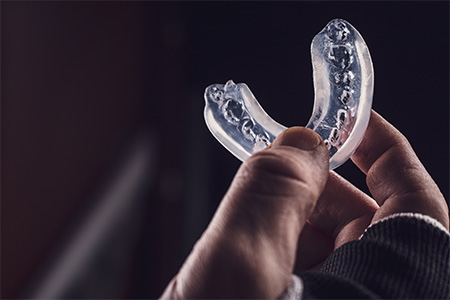
Do you grind your teeth at night due to bruxism? Not only can this condition lead to jaw pain, but it can cause significant damage to your dental implants over time. To keep your new teeth safe from the worst effects of bruxism, it’s recommended that you start wearing a nightguard when you go to sleep.
Additionally, if you play a sport of any kind, you need to be proactive about keeping your dental implants safe from any sudden blows to the mouth or jaw. Thus, even if you’re not told that you need a mouthguard, you should make a point of always wearing one when you’re out on the field or court.
Schedule Regular Dental Checkups

Your entire smile, dental implants included, will benefit from being periodically examined and cleaned by a trained dental professional. Scheduling a routine dental checkup and cleaning at our office every six months will give our team a chance to take a look at your dental implants and check for any problems that should be dealt with while they’re still small.
Dental Implant FAQs
Does Getting Dental Implants Hurt?
You won’t experience outright pain during your dental implant surgery because a local anesthetic will be administered before the treatment begins. There may be some pressure, but otherwise, your discomfort will be kept to a minimum while your implant posts are being inserted into your jaw.
The local anesthetic will wear off some time after your surgery is complete. At that point, you may experience some soreness and tenderness around the implant site. It’s recommended that you use pain medication (which may be prescribed or bought over the counter) to keep yourself comfortable. Many patients also benefit from using a cold compress.
Any discomfort you experience after dental implant surgery should be temporary. If it lasts longer than expected or appears to grow worse, call us immediately.
What Can Cause Dental Implants to Fail?
Dental implants might fail for any of the following reasons:
- A type of gum disease called peri-implantitis can occur in the area around the implant posts, damaging the tissues responsible for keeping them anchored in place.
- The implant posts may not be able to merge with the jawbone.
- The implant posts may become damaged by chronic teeth grinding or a blow to the mouth.
Additionally, poor oral hygiene, specific medications, and certain health conditions such as diabetes can all increase the risk of dental implant failure. Our team will make sure that you’re aware of the factors that can put your implant posts at risk, and we’ll give you tips for keeping the chances of failure to a minimum.
How Long Does It Take to Recover from Dental Implant Surgery?
Many people are able to return to their normal activities just one day after having dental implants placed. That being said, you will still need to take it easy for at least a week; strenuous exercise might slow down the healing process. In general, it can take around 48 to 72 hours for bleeding at the implant site to stop. Swelling usually hits its peak after about two to three days, gradually going down afterward.
It can take a matter of months for your mouth to fully recover from dental implant surgery. This is because the implant posts need time to finish fusing with the jawbone.
Is There Anything I Shouldn’t Eat with Dental Implants?
Following your dental implant surgery, you will need to stick to a diet of soft foods that require little to no chewing. It’s recommended that you stay away from anything that’s alcoholic, sugary, or acidic while your mouth is recovering.
Once your mouth has completely healed and your implant posts have been restored, you will have the freedom to eat virtually anything you want. That said, you will still need to be careful around certain foods. Hard foods like nuts or ice could end up damaging your implants, and sticky foods like taffy might dislodge your prosthesis.





